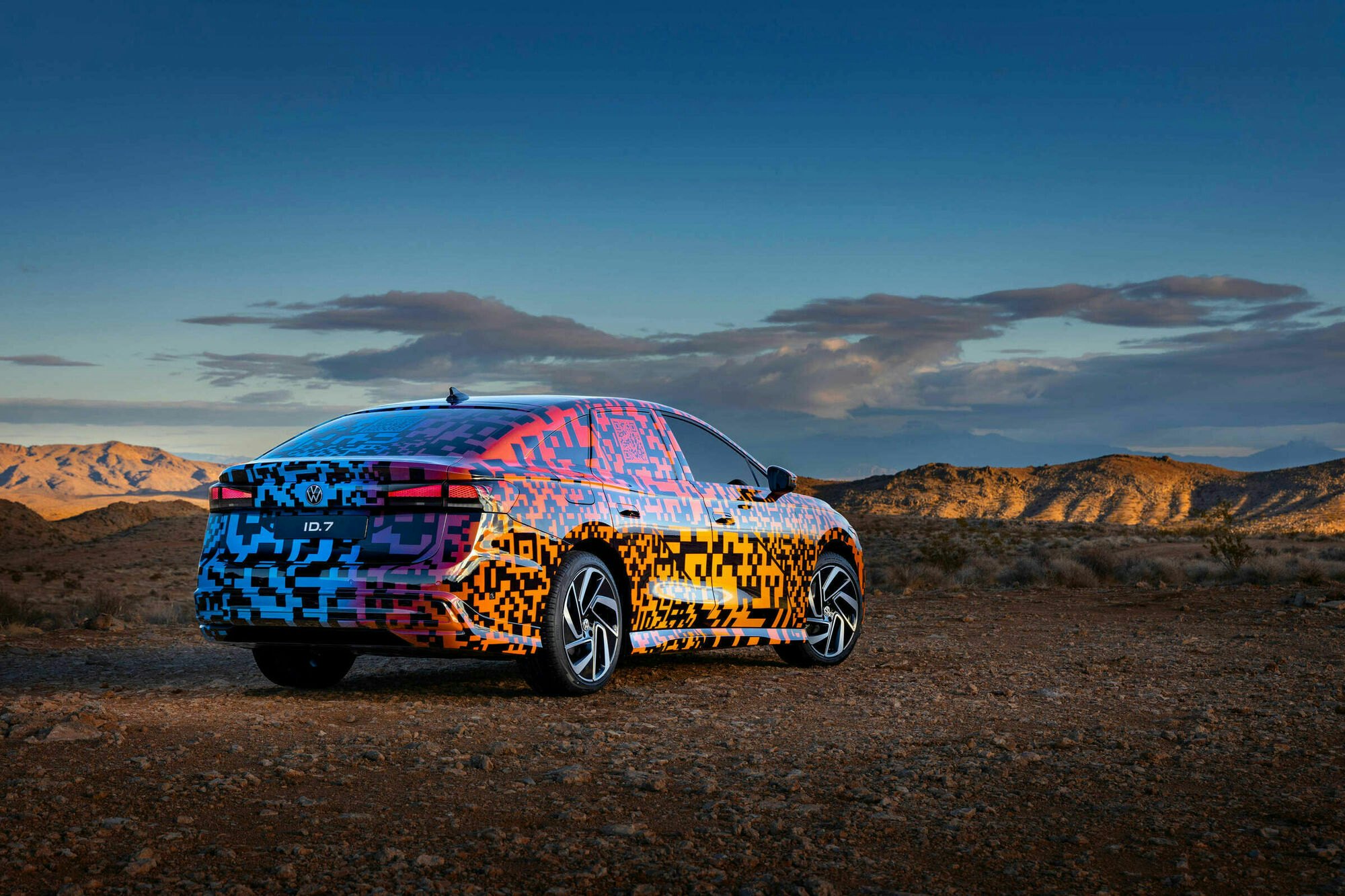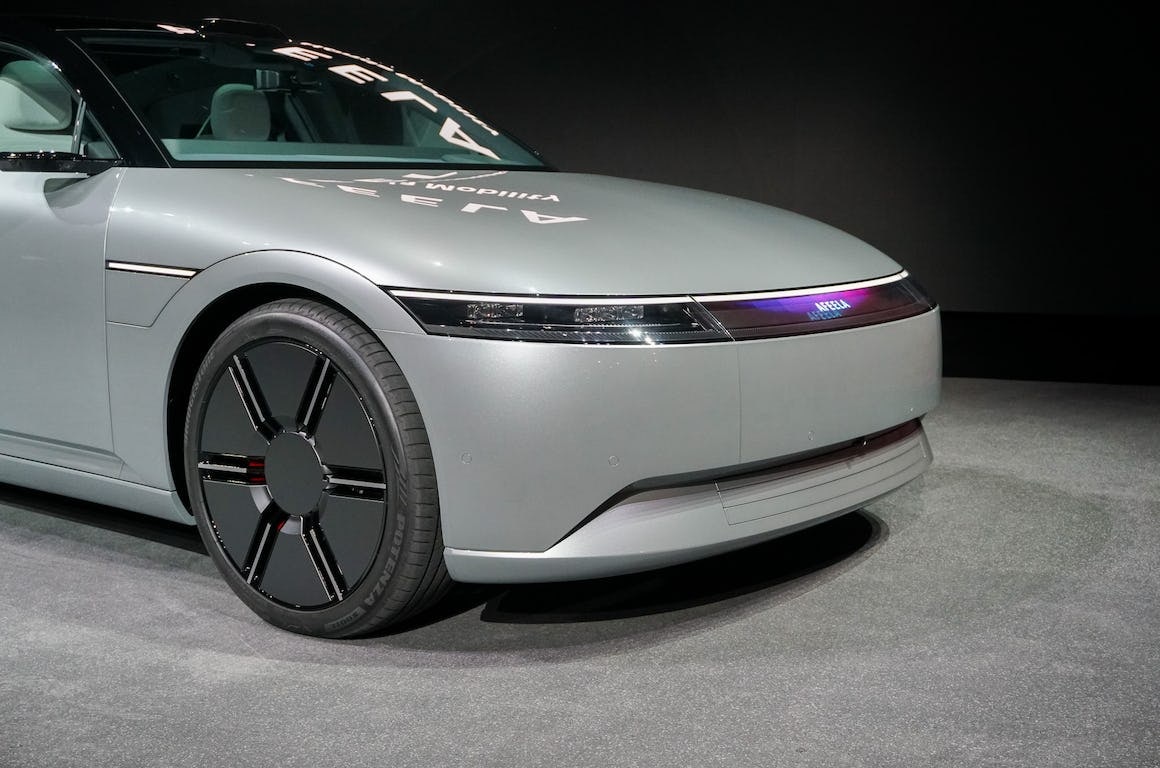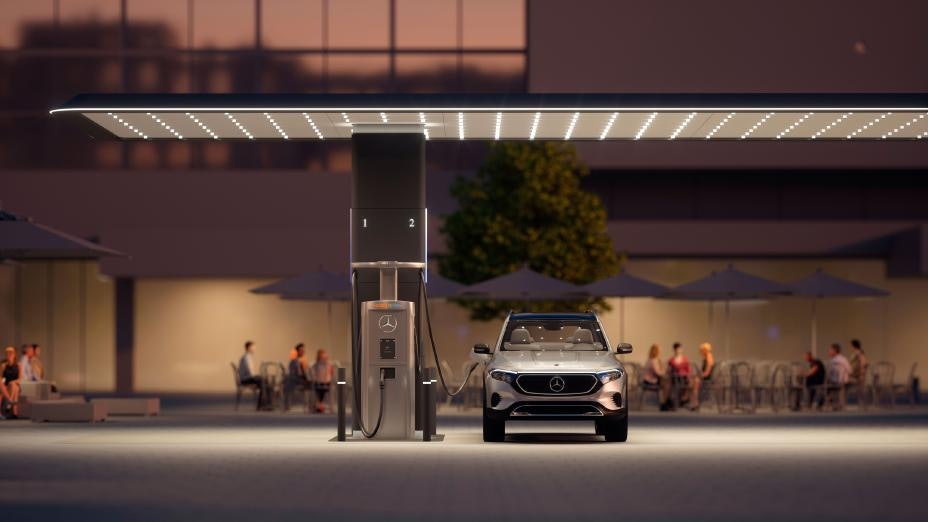
As CES continues its annual swelling, growing to encompass every type of consumer device (and swallowing much of Las Vegas along the way), the job of spotting trends gets harder and harder. There are just so many to choose from!
That said, EVs and electrification continue to be a major thread at CES. In 2023, that thread had all sorts of interesting twists and turns.
ID CHECK

Let's start with the one that you're most likely to actually see on the roads soon: Volkswagen's ID.7. Built on the same MEB platform as the ID.4 and the (sadly not-for-us) ID.3, the ID.7 will finally bring us an all-electric Volkswagen sedan. The CES car is covered in fancy, retroreflective camouflage, suitably bedecked in QR codes. It does look quite dazzling in person, but all that flash will be ripped off before it enters production. Underneath, the ID.7 is shaping up to be a fairly steady sedan that should fit in nicely next to the ID.4.
Beyond the four-door design, the big story here is the range. VW is estimating 700 kilometers on the European WLTP testing cycle. Here in the U.S., on the tougher EPA test, that should mean something in the area of 350 miles, perhaps as much as 100 more than the ID.4's range. The ID.7 will also feature a bigger, 15-inch central touchscreen, an augmented-reality heads-up display, and some boosted smarts that'll have the car automatically start heating or cooling itself when you approach, even if you forgot to precondition it through the app.
VW says it's already shipped 500,000 electric ID vehicles since September of 2020, hitting that goal a full year ahead of schedule. If all goes according to plan, the ID.7 will enter into production and start adding to those figures well before the end of 2023.
AFEELA

We'll have to wait a little longer for the next big EV at CES, the one that practically stole the show. It's a new version of the Sony Vision S EV that debuted back at CES 2020, now dubbed Afeela, a sort of umbrella brand for products from the Sony Honda Mobility partnership. All the bad jokes about that name have already been made so I'll leave it as a reader exercise to see if you can craft your own, but the branding is meant to evoke thoughts of autonomy, augmentation (as in AR), and affinity. It did not succeed.
Regardless, this new version of the car looks a little closer to production, though sadly a lot more boring, than that 2020 prototype. Standing next to it at CES left the impression of a bar of soap with LEDs. The few creases and styling details we saw in 2020 have been either ironed out or omitted entirely in this new version. The only real talking points visually are displays integrated into the bumpers. The so-called Media Bar is meant to be a multi-purpose display, signaling the car's intent to pedestrians and also doing standard stuff like showing charging state while it's plugged in.
Sony continues to say that the in-cabin entertainment will be unrivaled, though there are few details aside from level 3 autonomy, a whopping 45 cameras scattered in and around the thing, and data aggregated and processed by Qualcomm's Snapdragon Digital Chassis. This first Afeela will hit the road in the spring of 2026, which seems like an awfully long time away, especially considering it's already been three years since we saw the first one.
E INK GOES MOBILE
Still, that's a lot sooner than we'll be seeing BMW's i Vision Dee. It's another silly name, but at least this one's a concept car so you'll never have to worry about having to say "a Vision Dee" when someone asks what you drive. The most striking feature of this car is actually what it's wrapped in: full-color E Ink panels.
Continuing on the trend from last year's iX wrapped in monochrome E Ink, the i Vision Dee digs a little deeper into the color spectrum — though not too deep, with only 32 colors available. Still, the result is amazing, a shifting and dynamic look that BMW demonstrated to good effect, cycling through endless wild designs and even a few vintage liveries.
What's inside might be even more special: a full-width, augmented reality HUD that BMW says might actually enter production by 2025. This could mean advanced navigation prompts, intuitive warnings about pedestrians and obstacles, and even immersive entertainment should vehicular autonomy be in a better place by then. Taking advantage of all that display space, the rest of the cabin is blissfully minimalistic, a plain white dashboard with controls that only appear when needed.
It's one of the best, most promising concept cars I've seen in years, and that BMW decided to trot it out at CES shows just how significant this show continues to be to the auto industry.
REVOLUTION

Ram likewise had a concept, one that was a little bit bigger. Okay, it was mammoth. The Ram 1500 Revolution is a vision for a future 1500-class truck, with a spacious cab plus what looked like a full-length bed. Details were scarce on the electrification bit, but the interior at least was riddled with tech, including not one but two 14-inch touchscreens. The styling is somewhere between the familiar approach Ford took with the F-150 Lightning and the more radical reboot that Chevrolet presents with the Silverado EV. Visually, the Ram Revolution isn't a million miles from the current 1500, but with enough flares and flourishes to properly set it apart.
The problem is, while Ford's EV pick 'em up is already selling like hotcakes and Chevrolet's is coming soon, Ram's won't be here until next year. That seems a little unfortunate to me, but if they can nail the EV 1500's landing with a great product and good availability, it could be wading into the market at the perfect moment.
POSH CHARGE

The last thing worth highlighting isn't an EV at all, but something that could make EVs a little more pleasant to own. Mercedes-Benz announced a plan to follow in Tesla's footsteps and launch its own charging network. However, unlike Tesla, Mercedes will open its chargers to every other brand from day one — with one caveat.
Owners of Mercedes-Benz EVs like the EQS and EQE will be able to reserve chargers directly through their cars. MBUX navigation will automatically suggest where to stop and go so far as to place a hold on a charger, perfectly timed based on the nav's calculated ETA. Anyone else is free to use them, but only as they happen to be available.
Mercedes-Benz will make these chargers nice places to be, close to good food and surrounded by comprehensive security systems. Mercedes-Benz CTO Markus Schäfer even said he plans to ensure each location has spare parts handy and service technicians on-call to ensure that downtime is kept to a minimum.
It all sounds very appealing, the only questions are cost and convenience. With its initial $1 billion investment, Mercedes-Benz plans to install 2,500 chargers at over 400 locations in U.S. by 2027 and a planned 10,000 chargers globally. That'd make it roughly one-quarter the size of Tesla's Supercharger network, which has taken a decade to build. That's quick, and with charger speeds of up to 350 kW, charging won't take long either.
This year was a great CES for car spotting, a real return after a number of questionable years. With compelling concepts and genuinely practical technologies, we're left feeling excited about what's coming down the road. And isn't that how CES should make you feel?
INVERSE brings you everything from the fun and futuristic world of consumer technology at CES 2023. For all the latest technology coverage from the show, go to the INVERSE CES 2023 hub.







